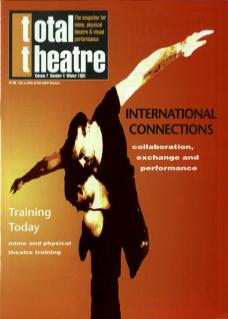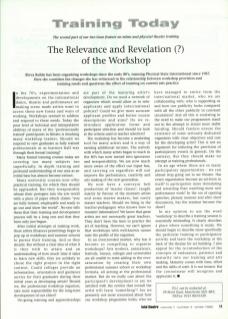In the 70s, experimentation and developments on the international dance, theatre and performance art making scene made artists want to access these new forms and ways of working. Workshops seemed to address and respond to these needs. Today the poor level of technical and interpretative abilities of many of the 'professionally trained' participants in Britain is shocking many workshop leaders. Should we respond to new graduates as fully trained professionals or as learners halfway through their formal training?
Many formal training courses today are covering too many subjects too superficially. In depth training and profound understanding of one area as an initial base has almost become extinct.
Many university courses now offer practical training, for which they should be applauded. But they irresponsibly release their protégés into the arts world with a piece of paper which claims ‘you are fully trained, employable and ready to go out and show the world’. No-one tells them that their training and development process will be a long one and that they have only just begun.
After initial attempts at making work, these artists (finances permitting) begin to pop up at workshops and summer schools to pursue their training. And so they should. But without a clear idea of what it is they wish to attain and an understanding of how much time it takes to learn new skills, they are unlikely to chose the right project in the right context. Could colleges provide an information, orientation and guidance service for their graduates during their initial years as developing artists? Should we, the professional workshop organiser, take more responsibility for the long-term development of our client?
Ongoing training and apprenticeships are part of the maturing artist's development. Do we need a network of organisers which would allow us to refer applicants and apply international policies? Could we give more accurate applicant profiles and better course descriptions and aims? Do we reintroduce application forms and participant selection and should we look at the criteria used in teacher selection?
The workshop has become a marketing tool for many artists and is a way of earning additional income. The naïvety with which many artists began to teach in the 80s has now turned into ignorance and irresponsibility. We are now much more aware of the effect our input has, and carrying on regardless will not improve the performance, creativity and arts making of the next generation.
We now have a conveyor belt production of 'masterclasses', taught mainly by flavour of the moment artists and some master makers, but rarely master teachers. Should we bring in the teacher-pedagogue who knows how to transmit information? We know that great artists are not necessarily great teachers. They don't have the time to practice the art of teaching. However, we can't ignore that workshops with well-known names raise the profile of the organiser.
In an overcrowded market, why has it become so compelling to organise workshops? Arts workers, animateurs, festivals, venues, colleges and universities are all unable to resist adding to the over-saturation by creating their own professional summer school or workshop formula, all aiming at the professional market. But do we really care about the participant's development or are we satisfied with the notion that overall the artist will learn something? Are we presently not more concerned about how our workshop programme looks, who we have managed to entice from the international market, who we are collaborating with, who is supporting us and how our publicity looks compared with all the other publicity in constant circulation? And all this is escalating in the need to make our programmes stand out in the attempt to attract more stable funding. Should funders ensure the existence of some seriously dedicated organisers with clear objectives and care for the developing artist? This is not an argument for reducing the provision of participatory events in general. On the contrary. But they should make no attempt at training professionals.
In an age where there are so many participatory opportunities, we can almost stop going out to see theatre. Has event organisation become an artform in itself? Is participation more stimulating and rewarding than watching most new performance work? In the era of opening speeches, plenary sessions and after show discussions, has the seminar become the show?
In my opinion, to use the word 'workshop' to describe a training session is essentially misleading. It clearly describes a place where something is made. We should begin to describe more specifically the particular training or participatory activity and leave the workshop at the back of the theatre for set building. I also appeal for the reintroduction of the concepts of endurance, patience and maturity into our training and arts making. Maturity comes with time, effort and the skills of craft. It is not instant. But the connoisseur will recognise and appreciate it.

